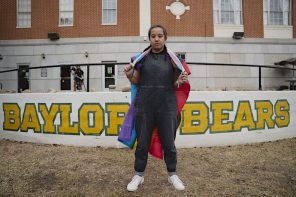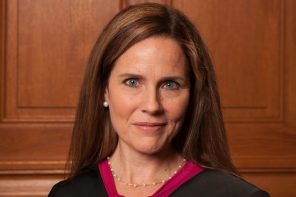Today the U.S. Supreme Court gutted our system of civil rights laws that have done so much to advance America’s aspirational promise of equality. Worse, the court eviscerated equality in a case it never should have heard.
303 Creative LLC v. Elenis is basically the same case as the Masterpiece Cakeshop case from five years ago (a.k.a., the “gay wedding cake case”)—only worse. In both, a business sought to discriminate against LGBTQ people. In 2018, a bakery did the discriminating while today’s decision involves a website design business. The same Christian nationalist legal outfit, Alliance Defending Freedom, is the driving force behind both cases. The same ADF lawyer attacked the same civil rights statute with the same First Amendment arguments in both cases (though the majority focused on speech this time, conspicuously avoiding freedom of religion).
The biggest difference between the two cases, other than the outcome, is that the underlying dispute the court decided on today was entirely fabricated. It was fake. The company claimed the Colorado Anti-Discrimination Act would have forced it to design wedding websites for LGBTQ couples. But when it filed the case, it didn’t even design wedding websites. It never had. It had never been asked to when it sued. It’s never denied service to anyone. It’s not had the civil rights law enforced against it. In short, nothing happened. This case is artificial. Hypothetical. Manufactured. Or, to use the legal term of art: bullshit.
ADF designed the case this way so that no party who’d been discriminated against would be able to put a face on 303 Creative’s bigotry. By erasing the true targets of the bigotry, ADF manipulated the narrative. There was no couple to interview, no actual victims—only ADF’s client and her version of the non-events. (The couple who suffered discrimination in Masterpiece commented on the 303 Creative case earlier today.) Before the decision, that was one significant difference between the two cases. Nothing about the law or the Constitution has changed since the 2018 case. In fact, the basic concepts here have been the same since 1968, when the Supreme Court laughed off as “patently frivolous” an argument that religion could somehow trump a civil rights law. The other significant difference is that the court personnel have changed: Christian nationalists have captured the Supreme Court. ADF and its fellow travelers were able to overcome decades of precedent—not because they’re right in the law, but because they packed the court.
Some outlets, in their misguided quest to prize balance over truth, will tell you that this case is about Lorie Smith, a small business owner—an artist. It’s not. It’s about a Christian nationalist crusade to gut civil rights laws. ADF has an extensive and repugnant anti-LGTBQ history. It’s argued versions of the same case—anti-LGBTQ Christians challenging public accommodation laws—for about a decade. Florists, photography studios, bakeries, and, now finally and successfully, a website company. Why? Because Christian nationalism is inherently unequal. The goal is a legal system where conservative, heterosexual, White Christian men are protected by the law, but not bound by it—and everyone else is bound by the law, but not protected.
That’s the goal that this opinion advances. But even if we ignore ADF and the captured court and the binding precedent, the case would still not be about some bigot named Lorie Smith. Media that speak about Lorie Smith are falling into ADF’s narrative. This case is about a business, a limited liability company. That’s what the abbreviation “LLC” in the case caption (303 Creative LLC v. Elenis) means: limited liability company. That business has opened itself up to the public.
The corporation is one of the most significant inventions of the last millennium. It exists to legally separate individual people from the businesses they operate. The corporation shields people and their assets (home and personal bank accounts and kids’ college funds) from business liabilities, creditors, and obligations. Forming a corporate entity, such as an LLC, comes with immense benefits. But also some strings, especially once it opens itself up as a place of public accommodation. Businesses must follow health regulations and environmental rules. And obey other regulations that keep consumers safe, including civil rights laws. Until now. The court just upended that system.
You’re unlikely to hear about LLCs and corporations and the corporate veil. Instead, you’ll hear that Lorie Smith is just one of the “many good and decent people [who] oppose same-sex marriage as a tenet of faith.” That’s a quote from John Roberts’ dissent in Obergefell v. Hodges, the case that recognized marriage equality as a basic human right—and he was talking about religious freedom and religious people. It’s rare that an LGBTQ issue gets a mention at this Supreme Court without a justice hastening to add that quote to the discussion. In the opinion, the ultra-conservative bloc mentioned the actual entity involved, 303 Creative LLC, only five times, three of the mentions appearing in quotes, while referring to “Smith” nearly 70 times. Justice Gorsuch even quotes Justice Sotomayor’s dissent and uses brackets to change Sotomayor’s reference to “the company” and “the owner’s” to “[her]” and “[her].”
Sotomayor’s dissent:
![]()
And Gorsuch’s touch-up:
![]()
The absurdity of hearing a case with no facts, no dispute, no victim, no real controversy at all, and of doing so before a captured court that pretended as if the vast body of corporate law didn’t exist, was exposed in oral argument last December. It was particularly evident in Justice Alito’s comments, from his demeaning hypothetical about a Black Santa and a child in a KKK sheet in response to Justice Jackson’s plausible hypothetical about anti-Black discrimination; to his insulting exchange with Justice Kagan about JDate, “a dating service, I gather, for Jewish people;” to his loathsome attempt at humor, “Maybe Justice Kagan will also be familiar with the next website I’m going to mention, AshleyMadison.com”—a website for those seeking extramarital affairs. The argument was unhinged because the case is untethered from reality.
The opinion suffers from the same malady—it’s divorced from reality. And the opinion should not be read as limited to LGBTQ people. The majority makes little attempt to, for instance, distinguish discrimination against LGBTQ people from racial discrimination—other than to say any analogy to “separate but equal” is “pure fiction.”
There’s a lot wrong with this, but let’s close by mentioning just two of the bigger flaws. The first problem I explained in my book, American Crusade:
“It’s impossible to draw a logical or consistent line between discrimination against one protected class (race) and another (sexual orientation) because once religiously motivated discrimination is permitted, the line has already been drawn in the wrong place.
…
Instead of drawing the line between night and day, the Crusaders tried to draw the line between shades of benighted bigotry.”
Second, the bigots are emboldened. ADF and the other Christian nationalist organizations are going to file case after case working to expand this decision to everyone from photographers to “sandwich artists.” Even after the gay wedding cake case, which didn’t give bigots the weapon they got today, they were still willing to test the limits of discrimination. We saw this quite clearly in the wake of that decision when one wedding venue initially turned away an interracial couple, saying “we don’t do gay weddings or mixed race, because of our Christian race—I mean, our Christian belief.”
That’s precisely what our civil rights laws were designed to protect against and have done so successfully for six decades. And that’s what the Supreme Court gutted today.





